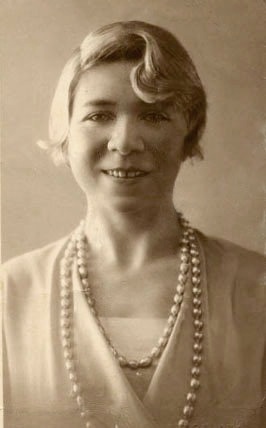 Alfonsina Storni (29 May 1892 – 25 October 1938) was an
Argentine poet of the
modernist period.[1]
Alfonsina Storni (29 May 1892 – 25 October 1938) was an
Argentine poet of the
modernist period.[1]
Queer Places:
Cementerio de la Chacarita, Av Guzmán 680, 1427 Buenos Aires
 Alfonsina Storni (29 May 1892 – 25 October 1938) was an
Argentine poet of the
modernist period.[1]
Alfonsina Storni (29 May 1892 – 25 October 1938) was an
Argentine poet of the
modernist period.[1]
Storni was born on May 29, 1892 in Sala Capriasca, Switzerland. Her parents were Alfonso Storni and Paola Martignoni, who were of Italian-Swiss descent. Before her birth, her father had started a brewery in the city of San Juan, Argentina, producing beer and soda. In 1891, following the advice of a doctor, he returned with his wife to Switzerland, where Alfonsina was born the following year; she lived there until she was four years old. In 1896 the family returned to San Juan, and a few years later, in 1901, moved to Rosario. There her father opened a tavern, where Storni did a variety of chores. That family business however soon failed. Storni wrote her first verse at the age of twelve, and continued writing verses during her free time. She later entered into the Colegio de la Santa Union as a part-time student.[2] In 1906, her father died and she began working in a hat factory to help support her family.[2]
In 1907, her interest in dance led her to join a traveling theatre company, which took her around the country. She performed in Henrik Ibsen's Ghosts, Benito Pérez Galdós's La loca de la casa, and Florencio Sánchez's Los muertos. In 1908, Storni returned to live with her mother, who had remarried and was living in Bustinza. After a year there, Storni went to Coronda, where she studied to become a rural primary schoolteacher. During this period, she also started working for the local magazines Mundo Rosarino and Monos y Monadas, as well as the prestigious Mundo Argentino.
In 1912 she moved to Buenos Aires, seeking the anonymity afforded by a big city. There she met and fell in love with a married man whom she described as "an interesting person of certain standing in the community. He was active in the politics..."[2] That year, she published her first short story in Fray Mocho.[2] At age nineteen, she found out that she was pregnant with the child of a journalist and became a single mother.[2] Supporting herself with teaching and newspaper journalism, she lived in Buenos Aires where the social and economical difficulties faced by Argentina's growing middle classes were inspiring an emerging body of women's rights activists.[3]
Storni was among the first women to find success in the male-dominated arenas of literature and theater in Argentina, and as such, developed a unique and valuable voice that holds particular relevance in Latin American poetry.[3] Storni was an influential person, not only to her readers but also to other writers.[4] Though she was known mainly for her poetic works, she also wrote prose, journalistic essays, and drama.[4] Storni often gave controversial opinions.[2] She criticized a wide range of topics from politics to gender roles and discrimination against women.[2] In Storni's time, her work did not align itself with a particular movement or genre. It was not until the modernist and avant-garde movements[5] began to fade that her work seemed to fit in. She was criticized for her atypical style, and she has been labeled most often as a postmodern writer.[6]
In 1935, Storni discovered a lump on her left breast and decided to undergo an operation. On May 20, 1935, she underwent a radical mastectomy.[2] In 1938 she found out that the breast cancer had reappeared.[2] Around 1:00 AM on Tuesday, 25 October 1938. Storni left her room and headed towards the sea at La Perla beach in Mar del Plata, Argentina and died by suicide. Later that morning two workers found her body washed up on the beach. Although her biographers hold that she jumped into the water from a breakwater, popular legend is that she slowly walked out to sea until she drowned. She is buried in La Chacarita Cemetery.[18] Her death inspired Ariel Ramírez and Félix Luna to compose the song "Alfonsina y el Mar" ("Alfonsina and the Sea").[19]
My published books: